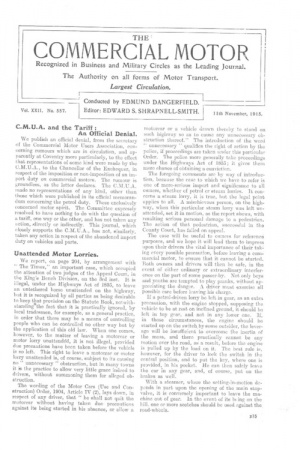The Authority on all forms of Motor Transport. Largest Circulation.
Page 1

If you've noticed an error in this article please click here to report it so we can fix it.
Conducted by EDMUND DANGERFIELD. Editor: EDWARD S. SHRAPNELL-SMITH. 1
C.M.U.A. and the Tariff : An Official Denial.
We publish an official denial, from the secretary of the Commercial Motor Users Association, concerning rumours which are in circulation, and apparently at Coventry more particularly, to the effect that representations of some kind were made by the C.M.U.A.., to the Chancellor of the Exchequer, in respect of the imposition or non-imposition of an import duty on commercial motors. The rumour is groundless, as the letter declares. The C.M.T.;.A. made no representations of any kind, other than those which were published in its official memorandum concerning the petrol duty. These exclusively concerned motor spirit. The Committee expressly resolved to have nothing to do with the question of a tariff, erne way or the other, and has not taken any action, Adirectly or indirectly. This journal, which closely supports the C.Ivf.TJ.A., has not, similarly, taken any action in respect of the abandoned import duty on vehicles and. parts.
Unattended Motor Lorries.
We report, on page 204, by arrangement with " The Times," an important case, which occupied the attention of two judges of the Appeal Court, in the King's Bench Division, on the 3rd inst. It is illegal, under the Highways Act of 1835, to leave an untethered horse unattended on the highway, but it is recognized by all parties as being desirable to keep that provision on the Statute Book, notwithstanding the fact that it is practically ignored, by local tradesmen, for example, as a general practice, in order that there may be a means of controlling people who can be controlled no other way but by the application of this old law. When one comes, however, to the matter of leaving a motorcar or motor lorry unattended, it is not illegal, provided due precautions have been taken before the vehicle is so left.. This right to leave a motorcar or motor lorry unattended is, of course, subject to its causing no" unnecessary " obstruction, but in many towns it is the practice to allow very little grace indeed to drivers, without summoning them for alleged obstruction.
The wording of the Motor Cars (Use and Construction) Order, 1904, Article IV (2), lays dawn, in respect of any driver, that " he shall not quit the motorcar without having taken due precautions against its being started in his absence, or allow a motorcar or a vehicle drawn thereby to stand on such highway so as to cause any unnecessary obstruction thereof." The introduction of the word unnecessary " qualifies the right of action by the police, if proceedings are taken under this particular Order. The police more generally take proceedings under the Highways Act of 1835; it gives them more chance of obtaining a -conviction.
The foregoing comments are by way of introduction, because the case to which we have to refer is one of more-serious import and significance to all owners, whether of petrol or steam lorries. It concerns a steam lorry, it is true, hut the legal point applies to all. A mischievous person, on the highway, when this particular steam lorry was left unattended, set it in motion, as the report shows, with resulting serious personal damage to a pedestrian. The action of that pedestrian, successful in the County Court, has failed on appeal.
The case will be useful to owners for reference purposes, and we hope it will lead them to impress upon their drivers the vital importance of their tak ing every possible precaution, before leaving a cons; mercial motor, to ensure that it cannot be started.. Both owners and drivos will then be safe, in the event of either ordinary or extraordinary interference on the part of some passer-by. Not only boys and youths are tempted to play pranks, without appreciating the danger. A driver must exercise all possible care before leaving his charge.
If a petrol-driven lorry be left in gear, as an extra precaution, with the engine stopped, supposing the vehicle to be at rest on inclined ground, it should be left in top gear, and not, in any lower one. If, in those circumstances, the engine should be started up on the switchby some outsider, the leverage will be insufficient to overcome the inertia, of the mass, and there practically cannot be any motion over the road, as a result, before the engine is pulled up by the load on it. The best rule is, however, for the driver to lock the switch in the central 'position, and to put the key, where one is provided, in his pocket. He can then safely leave the car in any gear, and, of course, put on the brakes as well.
With a steamer, where the setting-in-motion depends in part upon the opening of the main stopvalve, it is conversely important to leave the machine out of gear. In the event of its b( ing on the hill. one or more scotches should be used against the road-wheels.




















